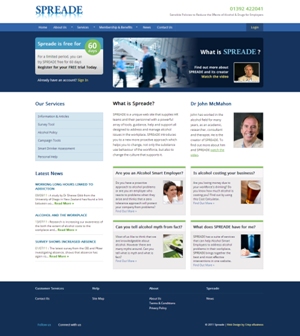Alcohol Related Issues in the Workplace
The impact of alcohol in the workplace is costing Britain’s businesses an average of £310 per employee but a new service, SPREADE, aims to target the problem and help employers become 'Alcohol Smart'.
SPREADE (Sensible Policies to Reduce the Effects of Alcohol and Drugs for Employers) will provide businesses with a powerful array of tools, guidance, help and support; all of which are designed to address and manage alcohol issues in the workplace.
SPREADE introduces employers to a new, proactive approach which helps change not only the drinking habits of the workforce, but also the culture that supports it. Currently a little over 50% of employers have an alcohol policy in place and less than 10% of those are proactive, running alcohol awareness programmes. This means that less than 5% of UK businesses are Alcohol Smart Employers. 
SPREADE has been devised by Dr John Mahon who knows more than most about the devastating effect alcohol can have, not only on the individual but also the people around them.
In August 1984 he was hospitalised with the DTs and alcohol withdrawal convulsions.
Diagnosed with brain damage (early stages of alcoholic dementia) and liver damage, he was given just six months to live if he did not stop drinking.
With 27 years of continuous sobriety, an honours degree in Psychology and a PhD later, Dr McMahon has dedicated his life to helping others face their addictions, trauma and self-destructive behaviours, drawing on his own personal experience and passion for recovery.
SPREADE targets non-dependent drinkers - those who do not drink heavily but where alcohol can still impact on their performance at work.
Most employers tend to focus on dependent drinkers as they are the ones who are likely to be absent the most. However, in a typical workforce, the vast majority are likely to be non-dependent drinkers. It is this group that is associated with the most lost time or highest cost to businesses through absenteeism and reduced productivity - around 80% of costs.
Few, if any of the employees within this category will have a problem with alcohol that will require any intervention by a medical professional.
It is therefore much more difficult to reduce associated costs by trying to manage it through disciplinary procedures or by referring them for treatment. SPREADE offers a mix of online tools and information in conjunction with personal consultancy, from information on alcohol policies and support materials through to personal help for individuals and their families, with employers choosing from a basic or enhanced service.
SPREADE addresses the issues of alcohol and the workplace, firstly by showing employers a new and more effective strategy for managing the effects of alcohol on their business, a strategy that will reduce the price that they are paying for their workers' drinking. Secondly, we give employers the tools to actually implement it. We make it easy for them to address the problem in a more effective way than has been seen before.
Dr McMahon
Businesses that use SPREADE will become Alcohol Smart Employers. This demonstrates they are serious about the welfare of their employees and sets out clear guidelines about what is and is not acceptable in the workplace.
Dr McMahon's career includes researching Motivation for Change in Alcohol Problems, leading to him devising and carrying out one of the first computer assisted treatments for problem drinking.
Teaching GPs, Psychologists, Social Workers and alcohol and drug counsellors at MSc and PhD level, he was responsible for setting up and writing the MSc in Alcohol and Drug Studies as a distance learning course at the University of the West of Scotland - now the largest course of its kind in the UK.
The author of two published books - 'First Steps out of Problem Drinking' (July 2010) and 'Bottled Up: A guide to surviving living with a problem drinker' (October 2010), Dr John McMahon has published around 50 papers in all major journals concerned with alcohol addiction e.g. Addiction, The Journal of Alcohol studies, Alcohol and Alcoholism and the British Journal of Psychology. He has also contributed chapters to books and to the Encyclopedia of Drugs and Alcohol.
In addition to SPREADE, Dr McMahon will also be launching BingeBusters in the Autumn - a national campaign to combat binge drinking, gathering and shaping public opinion around the issue. Encouraging people to be 'smart drinkers', the website will carry a manifesto, video vox pops and soundbites from people affected by binge drinking, in addition to a downloadable 'smart drinkers' pack.
Providing a platform for public opinion, BingeBusters aims to invite the public to participate and shape the campaign at a national and local level. McMahon also hopes to achieve more than 100,000 signatures on its combat binge drinking petition so the issue may be raised in Parliament.
www.spreade.com
www.bingebusters.org